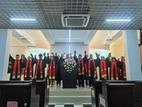The Chinese rural churches saw its heyday in the 1980s when there gathered so many believers in services that they had to stand at the door or by the road to hear sermons. However, the development of rural churches has been declining. Believers decrease though many old shabby churches were torn down, instead, new magnificent and fantastic church building are established. Why?
Preacher Chen from a church of Henan addresses his ideas on the current situation of the rural house church, the challenges it faces and the future transition direction.
Present situation of rural house church:
Chen states that there are two types of rural house:
Traditional. This kind of church gradually loses its influences on the locals.
In the past, the traditional church focused on conducting theological training classes, which belongs to one feature of rural house churches. Even a small house church held training classes with other churches, who gave priority to the education. Considering that all the funds supporting the classes come from outsiders and the church itself can't afford them, the classes are discontinued slowly when the church loses funding and young people hardly stay. The pastoral staff reduces. Coupled with close and conservative teaching, the number of this type of church starts to dwindle.
Some that migrate to cities. A church that migrates to cities can get access to better resources and receive financial aids from some organizations. It has an advantage that the young graduates who were trained there now serve in urban house churches or work in cities, as pioneers for its urban migration.
But those traditional churches who stay in rural areas without running training classes still gather in their original places. In the past, the church held training not for theology equipment, just for the reason that they could get funded while providing training. Preach Chen reveals that for example, his class that had twelve students reported that there were more than twenty students because funds were based on the number of students. When the number was low, the class would add the names of some graduates, teachers or migrate workers.
However, not all the funds were used to aid seminarians. The church diverted partial money to other purposes, although it got funded from other aspects but didn't get so much from "training classes." He mentioned that many years ago, a local issue caused extremely bad influence, which ended funding. At that time a church in Henan received a fund from an organization to pay each of 100 couples 30,000 yuan a year to support their mission in the Middle East, while it only gave 10,000 yuan to each couple, pocketing the rest. Moreover, many institutions held that they couldn't see the church growth after having provided funds for years, so they stopped funding.
He says that traditional churches are in a dangerous state in terms of their geographic locations or self-development capacity. Unlike three-self churches, house churches can only develop as long as it carries out ministries. Its vigor comes from its ministries. If it doesn't develop or do ministries, it dies away. In addition, the majority of Chinese believers don't distinguish churches from registration.
The general picture of the rural church:
Some rural house churches have their resources including funds for preachers, training classes, and meetings. If they lose those resources, their advantages no longer exist; as a result, believers don't have strong feelings for them. " A house church in our town starts to build its church building. It's connected with the outside churches and though not directly, it will ask donations from those churches when it needs help."
"For instance, there are lots of churches building church buildings in L City. Before the construction, they will make an approach to outside churches for sponsorship."
Why do believers donate little? He replies, for one thing, house churches have fewer members, compared to urban churches; for another, the donation amount is comparatively smaller. What's worse, they seldom have the awareness of "supporting preachers." Preachers make a living mostly by family incomes, farming or raising poultry or working in cities. A small portion of their earnings come from the church subsidies.
In large retreats such as training classes that last three, five or seven days, they receive donations ranging from 50 yuan to 100 yuan from believers. Besides, talents and influential preachers can receive extra donations from believers. But for the severely poor preachers, they get small donations from outside their mother churches.
Challenges rural churches face:
1. How to attract young people
Rural churches need to reflect on how they should lead the young generation to know the Christian faith rather than use the past thinking model.
2. Rural pastors and preachers need to study and progress.
Rural pastors and preachers have lower professional levels because there are no formal training opportunities for them and they don't have concepts of requiring deeper training. They are satisfied with the current nurturing ways and hold that they can shepherd everyone. However, if new believers who have higher levels than them, shepherding fails. So if preachers want no change, the church will vanish when the old members leave.
Chen introduces that once a pastor asked him how to keep those graduates who received training, but he answered that he couldn't, for the young generation need learning and larger places to enhance themselves while the rural churches are smaller and lack of resources. He suggested that pastor trains the middle-aged (over 40) in the villages. It will be more practical to train them who stay steadily in rural areas without pioneering spirits.
Unfortunately, many preachers can't get trained due to a lack of money, time or the thought of unnecessity. For the short-term training that lasts one, two or three months, they think that it wastes a season. As for free training, they want to attend. But there are not so much and the quality cannot be guaranteed.
Moreover, rural churches remand lower requirements for pastors or preachers than urban churches. "Some time ago, a man sent his son to advance in a seminary. Talented, his son could preach the sermon after having been educated for two months." So the low requirements for them partially contribute to why they don't want to study.
Direction & suggestions for the future transition of rural churches:
1. Study.
As it is stated above, pastors and preachers need to improve their ability. Ninety percent of rural preachers have no access to the Internet. Chen met a preacher at 37 during a retreat and found that he couldn't download songs on his smartphone. You can feel that rural believers don't belong to this age, who can't use the modern tools.
Some preachers hold that it's luxurious to have a computer that won't be used at home at the cost of several thousand yuan.
2. Have a sense of crisis.
Closed and undeveloped rural churches that want transition should firstly have a sense of crisis. The feature that house churches are easily connected with other churches can be applied to their transition. Other churches can drive the transformation of them when they don't know how to do it.
Former rural churches that have already moved to cities can lead those conservative churches for transition, such as by providing training approaches. Few rural preachers read because some who only read the Bible regard reading books as unnecessarily, some don't have books and the rest only read free, low quality books.












